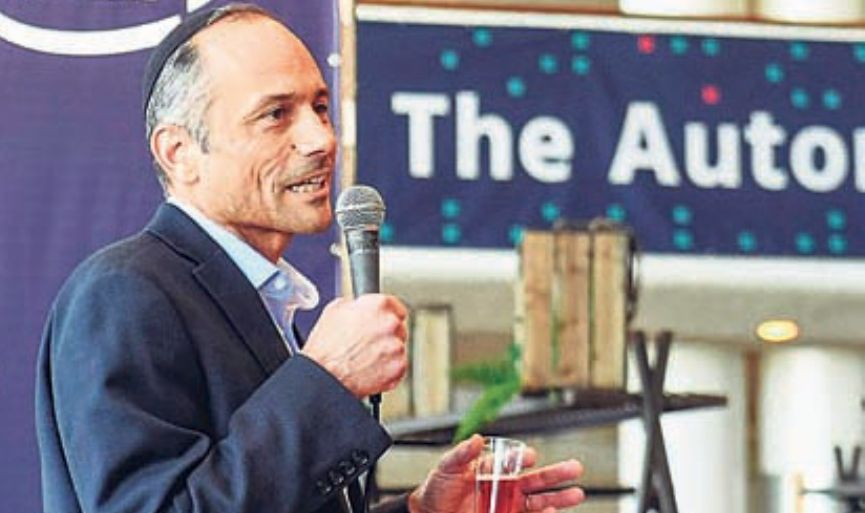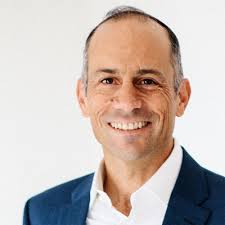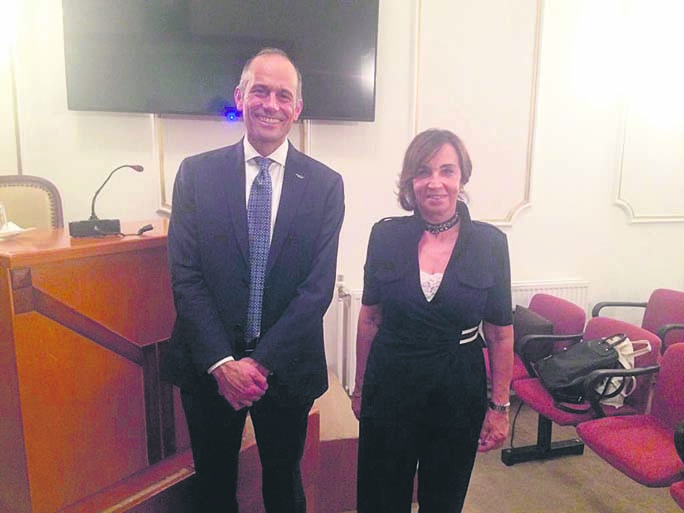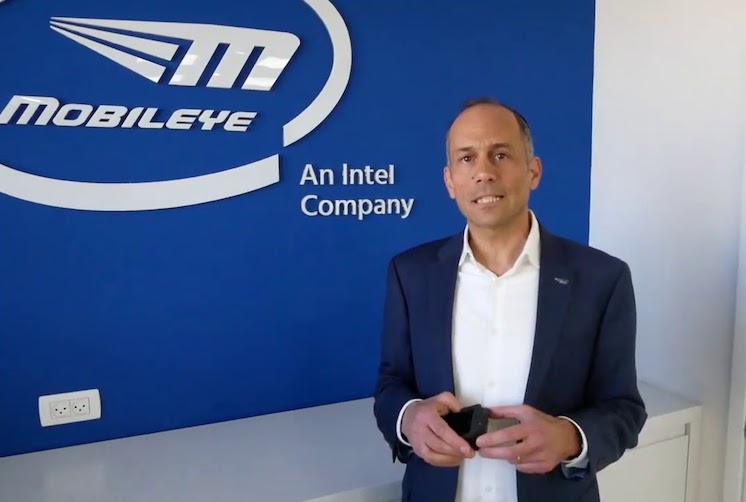
Mois Navon: I Want to Find Out How We Should Relate to Robots in the Future
Mois Navon quit his job after Mobileye was sold to Intel and he followed his passion for Jewish philosophy. Now he is known as the rabbi of Mobileye and giving lectures about Torah and science.
by Süzet Fransez
 Mois Navon, a prominent engineer of the Israeli Mobileye company that made the autonomous driving industry take a giant leap, was recently in Istanbul. Quitting his job after the company was sold to Intel with a record price, he followed his passion for Jewish philosophy. Now he is known as ‘the rabbi of Mobileye’ and giving lectures about Torah and science.
Mois Navon, a prominent engineer of the Israeli Mobileye company that made the autonomous driving industry take a giant leap, was recently in Istanbul. Quitting his job after the company was sold to Intel with a record price, he followed his passion for Jewish philosophy. Now he is known as ‘the rabbi of Mobileye’ and giving lectures about Torah and science.
Can you tell me about your youth, your studies and your first year of work?
I grew up a secular Jew in Los Angeles. My parents wanted me and my brothers to be successful in the US and so they tried to provide an upbringing that they felt would best allow that. They also wanted us to be connected to our Jewish traditions and so we observed – in some small way – the Shabbat and Holidays. In addition, we went to Hebrew school until we were Bar Mitzvah. That said, we lived a very “American” life – doing lots of sports and participating in the standard social life of secular America.
In high school I majored in math and science and in college I majored in Computer Engineering. My first year of work was pivotal in my life path. It was my second year in college and a friend of the family, Ray Eskenazi, hired me as a student intern at NASA’s JPL. He taught me a lot about computer design, but he also taught me a lot about Jewish philosophy. It was the first time someone took the time to explain the meaning behind all the traditions we had done as kids by rote. It was the first time that someone showed me the philosophical depth of the text of the Torah that we had leaned simply as a bunch of kids’ stories. In those years as a student intern at JPL, I learned the value of both Torah and Science – something that continues to guide me to this day.
Your mother was inviting high skilled people for dinner like doctors, architects, engineers in order to help you choose a career. Ray Eskenazi, originated from İstanbul, like you, who worked in Nasa, told you to become an engineer. How did he influence you?
The story was that when I was about to apply to UCLA, I did not know what major to be. I knew that l liked math and science. So, I said to my mom, I’ll be an architect. She invited an architect and he said do not be an architect. She invited a doctor and he said do not be a doctor. The next night she invited Ray Eskenazi, an engineer, and he said “engineering is great, you should be an engineer and when you finish, I’ll give you a job. So, I said okay and that was it.”

Mois Navon & Süzet Fransez
What made you decide to settle in Israel?
Basically, since we were little kids, we were raised knowing that Israel is the home of the Jews. I always felt that it is a place that I will live someday. I dropped that thought when I was in high school and college. I was very busy having a good time. When I started to work at NASA, I started to learn about Judaism and Israel came back into the picture.
Israel is the stage of Jewish history. If you want to influence Jewish history, if you want to be a part of Jewish history, I believe, you need to be in the land of Israel.
When did you start in Mobileye and what was the attraction that made you accept the job? Did you already know that every year 1,250 million people in the world, die annually on the road?
Yes, every year 1,250 million people - every day 3,400 people - are dying in car accidents. That’s what is driving this whole autonomous vehicle revolution… That’s why governments are pushing that this should happen, because we are trying to save lives. At the end of the day that is what it is all about.
Are you sure that this chip will help %100 to save lives in autonomous vehicles, which is becoming a reality of our time?
For sure it is going to save lives and it is already being proven to save lives. Is it going to reduce it to zero? No, there will still be accidents. People who do statistics, the RAND Corporation for example, believe that we will reduce accidents by 90%. While it is estimated that it will take until 2035 until autonomous cars are the norm, we will already start to see in the benefits of traffic accident reduction as autonomous vehicles slowly will roll out over the next 10-15 years.
Was it a surprise for you, when Intel paid 15.3 billion dollars to buy Mobileye?
The goal of the company’s CEO, Ziv Aviram, was not necessarily selling the company. Mobileye was opened to the public in 2014 the year it entered the New York stock exchange. That year, the company was valued at 5.3 billion dollars and was listed as the highest valued company in İsrael’s history. In 2016, the company’s value tripled to 15.3 billion dollars. We were all in shock. None of us expected that much.
When you say “autonomous vehicles can’t be programmed without ethical thinking”, do you mean that if you are not a believer, you cannot be ethical?
I will say it like this: everybody understands that ethics is important, we all try to decide what is the right thing to do. There are people who dedicate themselves to this field – they are known as ethicists. I believe that we, as Jews, were given this ultimate moral code called the Torah. But this also does not answer all questions, it helps us to approach ethical dilemmas with some kind of basis. Now regarding secular people, people who do not believe in God, as part of their grappling with ethical dilemmas they also look to religious traditions to see what do religious people say, what is their argument. So even if you are not a believer, that does not mean that you cannot learn something from people that do believe. We can have something to contribute to this discussion. So, I believe that this problem of programming autonomous vehicles ethically for which I wrote a paper entitled “The Trolley Problem and Autonomous Vehicles” can contribute to this whole discussion in the world about what is the right thing to do.
When you decided to quit Mobileye, to be full time into Torah study and teaching, people told you that you are crazy to leave such a position. Your answer was “I am an engineer by profession and a rabbi by passion”. How do you describe the “rabbi” inside you, that gives you so much passion?
I believe there is a creator, I believe there is a purpose and I believe that my position in that is to try to inspire people to make the most of their lives by seeking to fulfill that purpose. Ultimately, like we say in our prayers three times a day, “letaken olam be malhut şeday”, we are here to fix the world. Everybody does that in his own little way. İf you ask me, what drives me from inside, my answer will be “I am fulfilling a purpose”.
Do you want to be a Guru?
I do not want to be a guru. I have always been a kind of lone wolf. People follow me, people come and ask me questions and I am happy to answer…but I am not looking to be anybody’s guru.
How do you reconcile science and religion?
There are times when things do not look like they align, but more and more they are becoming aligned. The “big bang” is the greatest example of science coming around and aligning with what the Torah says. The “big bang” says there is a creation and everybody in the world, except the Jews, said there is none. On the other hand, sometimes we need to re-evaluate how we understand our text. For example, the Torah says creation took 7 days but science says 14 billion years – we need to understand the 7 days in a different way and indeed a number of religious physicists have written on this. I think it is appropriate and necessary to combine, to integrate what we call “Torah u mada”, Torah and science, Torah and secular learning. People who only learn Torah, they are depriving their Torah. Vilna Gaon told the translator of Euclid’s “Elements”, that it was very important to translate the math book into Hebrew, because “the person who lacks knowledge in math, will lack knowledge in Torah, one hundred times more.” You need to know math to know the Torah and you need to know science to be able to do Torah. We see this need in what we talked about regarding the ethical problems in autonomous vehicles, for example. We must be able to integrate science and Torah. I am reading right now all these different answers about “can you use an autonomous vehicle on Shabbat?” And I see that some rabbis that do not know enough science are unable to address the question sufficiently.
You are now working on a PhD. in Jewish philosophy at Bar Ilan University focusing on the interface between technology and morality? Can you give us some explanations...
The specific topic is called “the moral status of artificial intelligence”. This is putting the two fields together – Torah and Science. Basically, there are many questions of morality in artificial intelligence. For example: How do we use a robot ethically, and what is the right way to program it, and how is it helpful to humanity?
There is also a whole discussion about using autonomous weapons, using missiles or even drones to go and kill people. All these raise very important and deep ethical questions. But I am actually looking at another aspect of it. I am asking a question that a lot of philosophers today are asking. How do you relate to a robot that looks and answers like a person? If we can get a robot to be like a person, how do we relate to such being? Is it a person, is it an animal, is it a machine? So, for Jews, you believe in God, you have a soul and a robot does not have a soul so that is the end of the story. But you need to prove this Philosophically. In America, there is a professor who says “you are just artificial intelligence out of meat and that robot is artificial intelligence out of silicon, out of computer chips.” He wants to say that man and machine are both the same. I want to analyze this and see how we relate to these kinds of beings.
Your wife Deena says for you “He is not your typical computer geek; he is not your typical rabbi”. What do you think makes you atypical?
I think, she says it in both concerns. In terms of being a rabbi, I am not walking around in a big coat, with a big beard and in terms of being an engineer, I do not sit in front of my computer all day and without talking to anybody. I am also social. I go out and do a lot of different sports, and you know, I grew up surfing and skateboarding, and lately, I am racing bicycles. I do things that are out of the box.
Deena adds: He enjoys culture. He is not a geek, we go to theatres, movies, he plays sports and he is a rabbi also. He can relate to a lot of different people, Jews, non-Jews, religious, non-religious people. Really, not just on one path, very well-rounded.

Now that you choose to be led by your passion, being a rabbi, are you feeling that it was the right choice? Do you feel a deep satisfaction in your heart?
Today, I can answer yes. But when I quit, it was not so clear. When I stopped working, I did not really have a path yet. I knew that I wanted to start learning, start teaching. But I was not doing anything and I was sitting at home and I said to myself “what did you just do?” For 35 years, I got up in the morning, I went to work and this was my life. People told me to teach engineering, but I did not want to do that. I had a lecture here and there, but it was very slow. It was not moving. So, my wife told me to go and start studying at Bar Ilan University. I started to learn Jewish philosophy and started trying to teach more, lectures like I gave here in Istanbul, but it was difficult. I sent emails to all kinds of companies that are bringing groups to Israel, and only one person answered out of my hundreds of emails. But, from that one guy, he told somebody else who told somebody else, and now I have over 20 tour companies that are bringing groups every day. If I wanted to give this one inspirational lecture that I gave today in Istanbul, I can do it full time. But I want to teach more than this and so I am organizing an International Jewish Philosophy program at Bar Ilan University to allow anyone to come and learn important ideas for a half a day, a full day – or even just one lecture. And of course, I am also continuing to be the rabbi of Mobileye where I give my lunchtime lecture.
Do you want to add some words to this interview and transmit a message to the ancient community of your parents?
I think, I have always felt a kind of attachment to the Jewish community of Istanbul. I mean, I always felt that when you connect to your religion you look back to connect with your roots. I did not grow up religious, but I always had the vision of my grandparents here, that they were religious, and so I am following the tradition of my grandparents. I definitely feel a connection to this community. It gives me a kind of an anchor in the sea of history, I would say.
And in terms of a message to the community itself, on the one hand, I would say that it is very good that everyone is still trying to preserve this community feeling and on the other hand, I believe that İsrael is the stage of the Jewish history and at some point, it will be good that the people come to İsrael and take part in the revolution that is happening with our people, in the land of our people.
♦♦♦
MOBILEYE
The Israeli tech company Mobileye was established in 1999, to decrease the deaths and injuries in vehicle accidents. Buying this company, INTEL became the leader of the autonomous driving industry. Mobileye’s philosophy is; “If a person can drive a vehicle based on only his sight, so can a robot.”
Mobileye’s most important invention in automotive is the system they developed for autonomous vehicles. This system prevents accidents by sensing and warning the driver of possible collisions 2 seconds in advance. Cameras creating a 360-degree vision ability are placed in the vehicle making it able to detect anything bigger than 10 centimeters on the road.
Related Newsss ss







